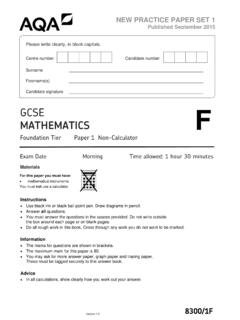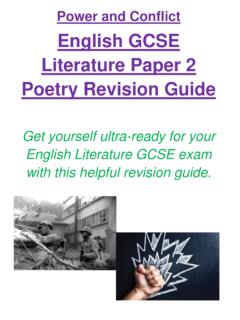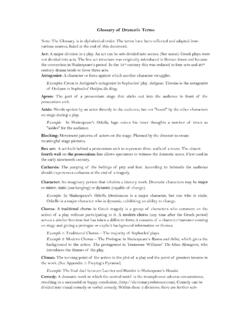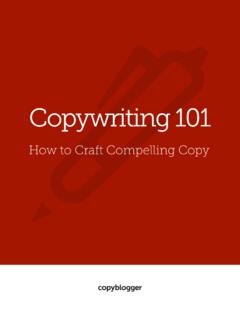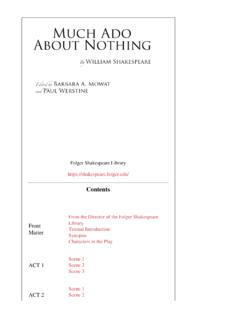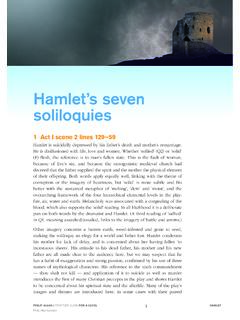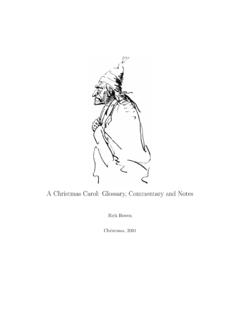Transcription of AQA English Literature Paper 1: Shakespeare (Macbeth)
1 AQA English Literature Paper 1: Shakespeare (Macbeth) A revision guide to get you ultra-ready for your AQA English Literature Paper 1 Section A exam question! AQA English Literature Paper 1: Shakespeare In your first question you will be provided with a short extract from Macbeth (it could be from anywhere in the play). Your question will ask you to discuss a particular theme or character shown in the extract and the rest of the play. This means for your revision you need to: 1) Know the plot of the play very well 2) Know the characters very well 3) Know key quotes for all the main characters and themes 4) Be able to analyse quotes for language and to consider the structure of the play 5) Understand the context of the play including when it was written and when it was set.
2 Here s an example AQA exam question for Section A: Section A: Shakespeare Answer one question from this section on your chosen text Macbeth Read the following extract from act 1 scene 5 of Macbeth and then answer the question that follows. At this point in the play Lady Macbeth is speaking. She has just received the news that King Duncan will be spending the night at her castle. The raven himself is hoarse That croaks the fatal entrance of Duncan Under my battlements. Come, you spirits That tend on mortal thoughts, unsex me here, And fill me from the crown to the toe topfull Of direst cruelty; make thick my blood, Stop up th access and passage to remorse That no compunctious visitings of nature Shake my fell purpose nor keep peace between Th effect and it.
3 Come to my woman's breasts, And take my milk for gall, you murd ring ministers, Wherever in your sightless substances You wait on nature's mischief. Come, thick night, And pall thee in the dunnest smoke of hell, That my keen knife see not the wound it makes Nor heaven peep through the blanket of the dark, To cry Hold, hold! Starting with this speech, explain how far you think Shakespeare presents Lady Macbeth as a powerful woman. Write about: how Shakespeare presents Lady Macbeth in this speech how Shakespeare presents Lady Macbeth in the play as a whole. [30 marks] AO4 [ 4 marks] Revision Activity 1: Making Notes on the Question Challenge: Create a detailed mind map of all the ways Shakespeare presents Lady Macbeth as a powerful woman in the play.
4 Extra Challenge: Add quotes to each of your ideas to support your interpretations. Mega Challenge: Evaluate how Lady Macbeth s power changes throughout the play. Write an analysis of this in your exercise book. Lady Macbeth as a powerful woman Lady Macbeth speaks to evil spirits and asks them to unsex me here . She wants to be able to carry out the murder without feeling anything about it. This shows she is capable of great evil and is therefore very powerful. Revision Activity 2: Analysing The Mark Scheme Look at the AOs above. Challenge: Highlight all the important words in the AOs. Write down five things you will need to include in your Macbeth answer to make sure you get a good mark. Extra Challenge: In your own words, write down exactly what skills and knowledge the examiners are looking for in your Macbeth answer.
5 Mega Challenge: How would you plan your essay to ensure you meet ALL these AOs? Revision Activity 3: PETAZL paragraphs Look back at the exam question included at the start of the booklet. Shakespeare shows Lady Macbeth as a powerful woman in this extract by illustrating her control over her language. When she says: The raven himself is hoarse / That croaks the fatal entrance of Duncan / Under my battlements Lady Macbeth uses metaphors to emphasise how determined she is to kill Duncan and take power for herself. The raven, a symbol of death in Jacobean England, is shown here to be personified and has a hoarse voice because it has been announcing Duncan s death so much. Moreover, the use of battlements to describe Lady Macbeth s home is military imagery to show to the audience that Lady Macbeth is intending to create conflict and ultimately kill the king so that she can take power.
6 Her use of language here shows she is determined to carry out her plan and shows how much power she has over what she says to the audience. P = Point E = Evidence (Quote) T = Technique A = Analysis Z = Zoom L = Link Using this example PETAZL paragraph: Challenge: Write out ONE PETAZL paragraph about the extract. Extra Challenge: Write out TWO PETAZL paragraphs one about the extract and one about the rest of the play. Mega Challenge: Begin writing out your full answer to this question. Key Themes Ambition Key point Relevant quote Explanation of quote Macbeth wants to be king so badly that he talks of murder early on in the play. My thought, whose murder yet is but fantastical The witches did not mention the idea of murder this is something Macbeth put into his own head.
7 This shows that deep down he is desperate to become king and will do anything to achieve it. Finished? Complete tables for the following themes: Fate/Free Will Violence Nature and the unnatural/supernatural Manhood Gender Time Key Quotes The Witches "Fair is foul, and foul is fair." (Act I, scene I) "When the battle's lost and won." (Act I, scene I) "When shall we three meet again in thunder, lightning, or in rain? When the hurlyburly 's done, When the battle 's lost and won." (Act I, scene I) "By the pricking of my thumbs, Something wicked this way comes." (Act IV, scene I) "Double, double toil and trouble; Fire burn, and cauldron bubble." (Act IV, scene I) Macbeth "If chance will have me king, why, chance may crown me.
8 " (Act I, scene III) "I dare do all that may become a man; Who dares do more is none." (Act I, scene VII) "I have no spur to prick the sides of my intent, but only vaulting ambition, which o'erleaps itself, and falls on the other." (Act I, scene VII) "Is this a dagger which I see before me, The handle toward my hand?" (Act II, scene I) "Will all great Neptune's ocean wash this blood clean from my hand? No, this my hand will rather the multitudinous seas incarnadine, making the green one red" (Act II, scene II) Macbeth: [Looking on his hands] This is a sorry sight. Lady Macbeth: A foolish thought, to say a sorry sight. Macbeth: There's one did laugh in 's sleep, and one cried, "Murther!" That they did wake each other.
9 I stood and heard them; But they did say their prayers, and address'd them Again to sleep. (Act II, scene II) "There's daggers in men's smiles." (Act II, scene III) "What's done is done." (Act III, scene II) "Out, out, brief candle! Life's but a walking shadow, a poor player that struts and frets his hour upon the stage and then is heard no more: it is a tale told by an idiot, full of sound and fury, signifying nothing." (Act V, scene V) "I bear a charmed life." (Act V, scene VIII) Malcolm About the old Thane of Cawdor: "Nothing in his life became him like the leaving it; he died as one that had been studied in his death to throw away the dearest thing he owed, as 't were a careless trifle." (Act I, scene IV) Lady Macbeth Lady Macbeth: The raven himself is hoarse That croaks the fatal entrance of Duncan Under my battlements.
10 Come, you spirits That tend on mortal thoughts, unsex me here, And fill me from the crown to the toe topful Of direst cruelty! (Act I, scene V) "Yet do I fear thy nature; It is too full o' the milk of human kindness." (Act I, scene V) "Look like the innocent flower, but be the serpent under't." (Act I, scene V) "Screw your courage to the sticking-place." (Act I, scene VII) Lady Macbeth: Why did you bring these daggers from the place? They must lie there. Go carry them, and smear The sleepy grooms with blood. Macbeth: I'll go no more. I am afraid to think what I have done; Look on't again I dare not. Lady Macbeth: Infirm of purpose! Give me the daggers. The sleeping and the dead Are but as pictures; 'tis the eye of childhood That fears a painted devil.
